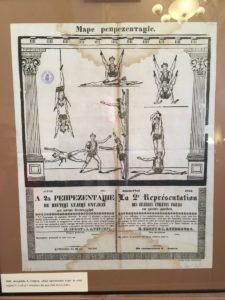8th May 2018
Britain in Craiova
As part of our ongoing campaign, #BritainInRomania, to illustrate the close ties between our two countries, the British Embassy has been working with museums across Romania in all those cities which have at one stage hosted a British Consulate.
This took me last month to the Museum of Oltenia in Craiova, for the launch of an exhibition put together with the great support of the museum, the Dolj County Council, and the Dolj County section of the National Archives, dedicated to the bilateral ties between the UK and Oltenia.

The earliest documents unearthed by the curators of the exhibition were posters from 1841 recording the visit to Craiova of two British acrobats. And there were some fascinating documents relating to the work of the “British Consular Agency in Little Wallachia”, set up in 1859 following the unification of the Principalities of Moldavia and Wallachia, in which England was one of the Guarantor Powers. The documents give a strong sense of the work of British diplomacy in Oltenia in the mid 19th century. Some of these focus on the consular role of British diplomats, in providing support to Britons in need of assistance. One details a reported insult to a British citizen named Ionica Antippa, allegedly perpetrated by a customs official by the name of Stan Enescu.
But most reflect the strong British commercial interest in Oltenia, and in particular in its rich agricultural lands. Sigmund Stein of Liverpool expresses his interest in setting up a sugar factory. The company Johnson & Bolton record their interest in purchasing Romanian flour – but only if it is of good quality. Another British company, Revolving Purifier, comes with a proposal to improve Craiova’s water quality.
While the Consulate in Craiova was closed in the 1860s, as its political raison-d’être declined following the creation of the Romanian United Principalities in 1862, British commercial activity in the region continued to develop. The exhibition includes for example a letter of 1903 from the company Watson & Youell proposing improvements to the municipal abattoir to allow the blood of slaughtered cows to be used as fertiliser.
And the exhibition highlights the important role played by Craiova-born Nicolae Titulescu, Romania’s most famous diplomat, in the development of the bilateral relationship between the UK and Romania. It was great to see at the opening of the exhibition a group of animated students from the Carol I High School in Craiova, from which Titulescu himself was a graduate. His distinguished diplomatic career included an important role alongside Queen Marie in Versailles in securing an advantageous peace settlement for Romania following the First World War; a major role in the creation of the League of Nations, in which he twice served as President of the General Assembly, and a significant spell as Romanian Ambassador to London from 1921-1927, before returning to Romania as Foreign Minister. A liberal, in a Romania which was moving increasingly to the right during the 1930s, he was exiled in 1936 on the orders of King Carol II and died in France.
As Romanian Ambassador to London he was a considerable success, serving at a crucial time of the consolidation of the post-World War I peace settlement, which Britain supported. Titulescu was anglophile, and convinced that close relations with both the UK and France should be cornerstones of Romanian diplomacy. He oversaw the important visit of King Ferdinand to London in 1924, accompanied by Foreign Minister Ion Gheorghe Duca. He promoted Romanian studies in UK universities and was assiduous in defending Romania’s position in interviews with the British press.
Craiova today is an embodiment of the continued partnership crafted by the work of distinguished individuals like Titulescu. The impressive factory of Ford Romania has been rapidly expanding its work-force on the strength of the success of the EcoSport Model. The UK is one of the major customers of the EcoSport, as well as the source of key components, including engines, providing an example of the way in which the UK is tied up so closely in the economy of Oltenia. And more than a hundred years on from the letters of Johnson & Bolton and Watson & Youell the agricultural sector in Dolj County remains a significant focus for UK investors.

The launch during my visit of a guide for innovative teachers by the impressive team at the Romanian-British School of Craiova was a reminder of our close educational ties. And the opening of the eleventh edition of the International Shakespeare Festival of Craiova, with again a strong participation from British theatre groups and Shakespeare scholars, was an eloquent testament to the enduring depth of UK cultural links with the city.